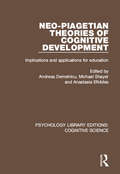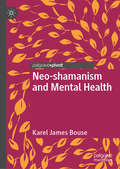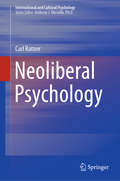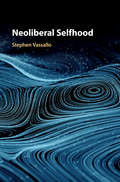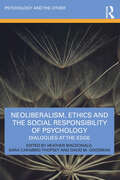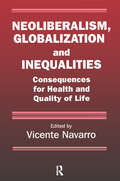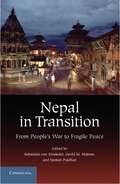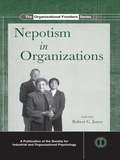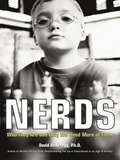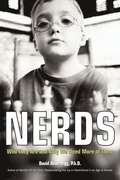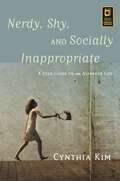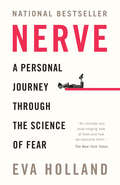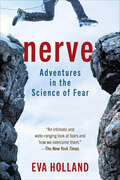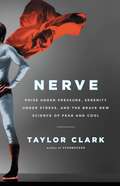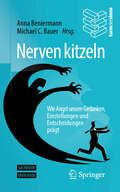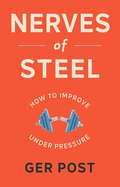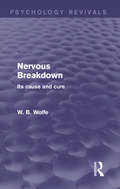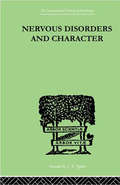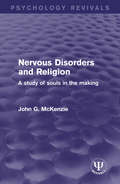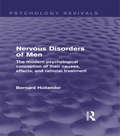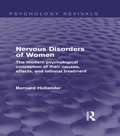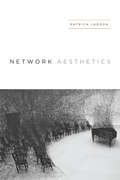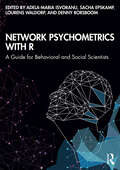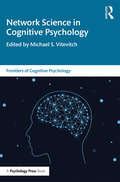- Table View
- List View
Neo-Piagetian Theories of Cognitive Development: Implications and Applications for Education (Psychology Library Editions: Cognitive Science)
by Anastasia Efklides Andreas Demetriou Michael ShayerPiagetian theory was once considered able to describe the structure and development of human thought. As a result, it generated an enthusiasm that it could direct education to develop new teaching methods, particularly in science and mathematics. However, disillusionment with Piagetian theory came rather quickly because many of its structural and developmental assumptions appeared incongruent with empirical evidence. In recent years several neo-Piagetian theories have been proposed which try to preserve the strengths of Piaget’s theory, while eliminating its weaknesses. At the same time several other models have been advanced originating from different epistemological traditions, such as cognitive/differential psychology or socio-historical approaches. Originally published in 1992, this title was unique in representing most of these theories and traditions. Specifically, the authors focus their work on the educational implications of their research. The chapters are organised in three parts: the first part presents some widely known models of cognitive development and discusses their implications for different aspects of education; the second part is devoted to learning and cognitive acceleration; while part three highlights teaching methods that would improve the acquisition of particular skills in specific areas. Written by an eminent group of truly international contributors, this title will still be useful to students and researchers in cognitive development and education, as well as educational policy makers.
Neo-shamanism and Mental Health
by Karel James BouseThis book explores the contemporary practice of Neo-shamanism and its relationship to mental health. Chapters cover the practice of Neo-shamanism, how it differs from traditional shamanism, the technology of the shamanic journey, the lifeworlds of some of its practitioners, as well as its benefits and pitfalls. The author’s analysis draws on an in-depth study of existing literature, original qualitative-phenomenological research into the lifeworlds of practitioners, and nearly three decades of observation and experience as a student, teacher and practitioner of Neo-shamanism. She discusses the potential role of Neo-shamanic journey technology as an approach for psychology-based studies of consciousness and anomalous phenomena; its value as a tool for self-exploration as part of a supervised curriculum; as well as the possible therapeutic applications of the journey and shamanic healing protocols for use by mental health professionals. This book is a rich and timely resource for students and teachers of psychology, anthropology and sociology, psychotherapists, and anyone who is interested in consciousness and parapsychology.
Neoliberal Psychology (International and Cultural Psychology)
by Carl RatnerThis provocative monograph defines the elusive concept of neoliberal psychology, focusing on its form, content, and cultural contexts and establishing it as a core feature of modern society. Its cross-cultural analysis examines the reality of neoliberal psychology in the globalized world, asserting that neoliberalism influences individuals’ sense of self, identity, and—regardless of country of origin—concept of nationality. Macro cultural psychological theory opens out neoliberal psychology in its most visible aspects, such as work life, sexuality, consumer behavior, and the shared vision of the good life. At the same time, the author identifies profound social inequities and other negative aspects of neoliberal society and discusses how they may be corrected. Included in the coverage: Snapshots of neoliberal society and psychology.A psychological theory for comprehending neoliberal psychology.Neoliberalism as a cultural, political, economic, ideological system.The neoliberal class structure of phenomena.Psychological and cultural emancipation, and macro cultural psychological theory. Since neoliberalism is the dominant social system in today’s world, and because it commands both strong support and strong criticism from diverse interest groups, Neoliberal Psychology will be of general interest to a wide readership. The book’s psychological focus is a new window into neoliberalism that is more accessible than more technical accounts of its economics and politics, and it should appeal especially to social science students and professors.
Neoliberal Selfhood
by Stephen VassalloPsychological constructs - such as emotion regulation, creativity, grit, growth mindset, lifelong learning, and whole child - are appealing as pedagogical aspirations and outcomes. Researchers, policy-makers, and educators are likely to endorse and accept these constructs as ways to make sense of students and inform pedagogical decision-making. Few critically interrogate these constructs, as they are associated with students' academic achievement, psychological well-being, civic virtue, and career readiness. However, this book shows how these constructs become entangled in a neoliberal vision of selfhood, which is tied to market prescriptions and is thus associated with problematic ethical, psychological, moral, and economic consequences. The chapters draw attention to the ideological underpinnings in order to facilitate conversations about selfhood in schooling policy and practices.
Neoliberalism, Ethics and the Social Responsibility of Psychology: Dialogues at the Edge (Psychology and the Other)
by Heather Macdonald David M. Goodman Sara Carabbio-ThopseyThis volume encompasses deeply critical dialogues that question how the field of psychology exists within and is shaped by the current neoliberal political context. Spanning from psychoanalysis to post-colonial theory, these far-reaching discussions consider how a greater ethical responsiveness to human experience and sociopolitical arrangements may reopen the borders of psychological discourse. With the understanding that psychology grows in the soil of neoliberal terrain and is a chief fertilizer for neoliberal expansion, the interviews in this book explore alternative possibilities for how this field of study might function. By offering their own unique responses regarding the current condition of their respective disciplines, these scholars critically consider the current conceptual frameworks that set the theoretical boundaries of psychology, and contemplate the ethical responsibility currently affecting the field. This book will prove essential for scholars and students across several disciplines including psychology, philosophy, ethics, and post-colonial and socio-cultural studies, as well as practising mental health professionals with an interest in the importance of psychological social theory.
Neoliberalism, Globalization, and Inequalities: Consequences for Health and Quality of Life (Policy, Politics, Health and Medicine Series)
by Vicente NavarroSince U.S. President Reagan and U.K. Prime Minister Thatcher, a major ideology (under the name of economic science) has been expanded worldwide that claims that the best policies to stimulate human development are those that reduce the role of the state in economic and social lives: privatizing public services and public enterprises, deregulating the mobility of capital and labor, eliminating protectionism, and reducing public social protection. This ideology, called 'neoliberalism,' has guided the globalization of economic activity and become the conventional wisdom in international agencies and institutions (such as the IMF, World Bank, World Trade Organization, and the technical agencies of the United Nations, including the WHO). Reproduced in the 'Washington consensus' in the United States and the 'Brussels consensus' in the European Union, this ideology has guided policies widely accepted as the only ones possible and advisable.This book assembles a series of articles that challenge that ideology. Written by well-known scholars, these articles question each of the tenets of neoliberal doctrine, showing how the policies guided by this ideology have adversely affected human development in the countries where they have been implemented.
Nepal in Transition
by Sebastian Von Einsiedel David M. Malone Suman PradhanSince emerging in 2006 from a ten-year Maoist insurgency, the "People's War," Nepal has struggled with the difficult transition from war to peace, from autocracy to democracy, and from an exclusionary and centralized state to a more inclusive and federal one. The present volume, drawing on both international and Nepali scholars and leading practitioners, analyzes the context, dynamics, and key players shaping Nepal's ongoing peace process. While the peace process is largely domestically driven, it has been accompanied by wide-ranging international involvement, including initiatives in peacemaking by NGOs, the United Nations, and India, which, throughout the process, wielded considerable political influence; significant investments by international donors; and the deployment of a Security Council-mandated UN field mission. This book shines a light on the limits, opportunities, and challenges of international efforts to assist Nepal in its quest for peace and stability and offers valuable lessons for similar endeavors elsewhere.
Nepotism in Organizations (SIOP Organizational Frontiers Series)
by Robert G. JonesThere is a huge elephant in the room: organizational decisions are often based on family relationships, rather than on the ‘rational’ approach advocated by many professionals. Textbooks on Human Resources, Management, Organizational Behavior, Economics, Public Administration, and a host of related areas seem to have entirely missed this important aspect of organizational decision making. This book seeks to change all of this. By clearly identifying and defining nepotism in organizations, this book pulls back the curtain on the primary basis for many of the important things that really happen in organizations, large and small. The authors skillfully weave examples of nepotism in real organizations with the usual scholarly textbook topics (hiring, leadership, employment law, career search, culture, etc.) in a way that defines an entire new field of quantitative organizational research. This new book in SIOP's Organizational Frontiers series represents the first time IO psychologists have looked at the important subject of nepotism in organizations.
Nerds: How Dorks, Dweebs, Techies, and Trekkies can save America and why they might be our Last Hope
by David Anderegg"Anderegg's clear-eyed look at a damaging cultural truism does nerds and jocks-all Americans, really-a service. " (The Washington Post). Thick glasses, socially awkward, a math whiz with a pocket protector- everyone knows what a nerd is. But where did this stereotype come from? Children aren't born knowing what a "nerd" or "geek" is, so why do they know by the age of five or six that they don't want to be one? In this revised and updated paperback edition of his thought-provoking book, family psychotherapist and psychology professor David Anderegg reveals how the systematic disparagement of "nerds" in our culture is bad for our children and even worse for America. In Nerds, Anderegg examines why science and engineering have become socially poisonous disciplines, why adults wink at the derision of "nerdy" kids, and what the cost of this rising tide of anti- intellectualism is to both our children and our nation. Drawing upon education research, psychological theory, and his own interviews with nerdy and non-nerdy kids alike, Anderegg argues that in order to prepare rising generations to compete in the global marketplace, we need to revisit how we think about "nerds. " .
Nerds: Who They Are and Why We Need More of Them
by David AndereggAre you socially awkward? Technologically sophisticated or just 1 extremely passionate about one or more subjects? Well, maybe you're a "nerd." And what's wrong with being a nerd? In this fascinating book, child and family psychologist David Anderegg examines the process by which kids learn what nerds are, and what happens to their identities as a result of their developing awareness of this uniquely American stereotype. In Nerds, Anderegg surveys the long history of American anti-intellectualism and its current avatar: antinerd sentiment. Although at first glance it may not seem so bad to call someone a nerd, this stereotype is wreaking havoc in the lives of our children, affecting their performance in school and ultimately jeopardizing American economic competitiveness. (It may not be an accident that international math and science testing shows American fifteen-year-olds in twenty-fourth place among the world's most developed countries.) Deftly revealing layers of cultural "knowledge" about nerds, Anderegg explores such topics as: * the conformity of adolescence and the endurance of adolescent stereotypes, long after people should know better * the pathologizing of nerds with diagnoses such as Asperger's syndrome O the archetypal struggles of nerds and jocks in popular culture and history . Using educational research, psychologic theory, and interviews with kids themselves, Anderegg urges readers to start deconstructing this most harmful of social constructions before any more smart and self-confident kids stop being so interested in what they're interested in In other words, before they stop being kids.
Nerdy, Shy, and Socially Inappropriate: A User Guide to an Asperger Life
by Cynthia KimCynthia Kim explores all the quirkyness of living with Asperger Syndrome (ASD) in this accessible, witty and honest guide looking from an insider perspective at some of the most challenging and intractable aspects of being autistic. Her own life presents many rich examples. From being labelled nerdy and shy as an undiagnosed child to redefining herself when diagnosed with Asperger Syndrome as an adult, she describes how her perspective shifted to understanding a previously confusing world and combines this with the results of extensive research to explore the 'why' of ASD traits. She explains how they impact on everything from self-care to holding down a job and offers typically practical and creative strategies to help manage them, including a section on the vestibular, sensory and social benefits of martial arts for people with autism.Well known in the autism community and beyond for her popular blog, Musings of an Aspie, Cynthia Kim's book is rich with personal anecdotes and useful advice. This intelligent insider guide will help adults with ASDs and their partners, family members, friends, and colleagues, but it also provides a fresh and witty window onto a different worldview.
Nerve: A Personal Journey Through the Science of Fear
by Eva HollandA personal story about not only facing but conquering fears. In 2015, Eva Holland was forced to confront her greatest fear when her mother had a stroke and suddenly passed away. After the shock and grief subsided, Holland began to examine the extent to which her many fears had limited her, and wondered whether or not it was possible to move past them.This sent Holland on a deep dive into the science of fear, digging into an array of universal and personal questions: Why do we feel fear? Where do phobias come from and how are they related to anxiety disorders and trauma? Can you really smell fear? (Yes.) What would it be like to feel no fear? Is there a cure for fear? Or, put differently, is there a better way to feel afraid?On her journey, Holland meets with scientists who are working to eliminate phobias with a single pill, she explores the lives of the few individuals who suffer from a rare disease that prevents them from ever feeling fear, and she immerses herself in her own fears including hurling herself out of a plane for her first skydive (and in the process, learns that there are right and wrong ways to face your fears).Fear is a universal human experience, and Nerve answers these questions in a refreshingly accessible way, offering readers an often personal, sometimes funny, and always rigorously researched journey through the science of facing our fears.
Nerve: Adventures in the Science of Fear
by Eva HollandAward–winning, bestselling journalist Eva Holland’s Nerve is “an intimate and wide-ranging look at fears and how we overcome them” (New York Times).A TIME Top 100 Must Read Since childhood, Eva Holland has been gripped by two debilitating phobias: fear of losing her mother and fear of heights. The worst comes to pass with her mother’s sudden death in 2015, and something shifts for Eva. Then, when an ice-climbing expedition ends with Eva embarrassed and in tears, a new resolve kicks in: Fear may define her past, but it won’t decide her future! Through incredibly moving storytelling and boots-off-the-ground investigation, Holland peels back the layers of paralyzing dread to ask: Is fear necessary? Is it rooted in the body or the mind? And even: Is there a better way to feel afraid? By grappling with, even embracing, her innermost dreads, Holland aspires to give us all the nerve to face down the phobias that limit our lives. “The publication of Nerve could be one of the most germane and significant books to help people navigate through our current dark and unfamiliar emotional and physical territory. With acuity of purpose, author Holland demonstrates to her audience that armed with a baseline of knowledge, fear is an emotion that can be experienced, examined, and conquered, thereby strengthening the human psyche and its ability to deal with future catastrophes.” —New York Journal of Books“Nerve is brave and tender, and an example of why journalists treating themselves as guinea pigs should never completely go out of style.” —WIRED
Nerve: Poise Under Pressure, Serenity Under Stress, and the Brave New Science of Fear and Cool
by Taylor ClarkNerves make us bomb job interviews, first dates, and SATs. With a presentation looming at work, fear robs us of sleep for days. It paralyzes seasoned concert musicians and freezes rookie cops in tight situations. And yet not everyone cracks. Soldiers keep their heads in combat; firemen rush into burning buildings; unflappable trauma doctors juggle patient after patient. It's not that these people feel no fear; often, in fact, they're riddled with it. In Nerve, Taylor Clark draws upon cutting-edge science and painstaking reporting to explore the very heart of panic and poise. Using a wide range of case studies, Clark overturns the popular myths about anxiety and fear to explain why some people thrive under pressure, while others falter-and how we can go forward with steadier nerves and increased confidence.
Nerven kitzeln: Wie Angst unsere Gedanken, Einstellungen und Entscheidungen prägt
by Michael C. Bauer Anna BeniermannWir schlottern vor Angst, wollen fliehen oder erstarren – keine Frage, Angst ist eine der wichtigsten menschlichen Grundemotionen, und jede*r kennt die Macht, die sie über uns haben kann. So unangenehm sie ist: Evolutionär gesehen hat sie eine wichtige Funktion. Denn sie schützt uns, indem sie unsere Aufmerksamkeit auf mögliche Gefahren lenkt. Angst löst in gefährlichen Situationen angemessenes Verhalten, wie Flucht oder Abwehr, aus, sie schärft unsere Sinne und bringt uns in Höchstform.Welche Bedeutung Angst hat, welche physiologischen Prozesse ihr zugrunde liegen und wie sie insbesondere aus der Sicht der Hirnforschung und Psychologie entsteht und wirkt, steht im Mittelpunkt dieses Buches. Renommierte Experten verschiedener Fachgebiete von Neurologie über Psychologie und Pädagogik bis zur Soziologie beleuchten, wie Ängste unser Verhalten beeinflussen – wie sie für uns zur Belastung werden, aber auch, wie sie uns einen „Kick“ geben können.
Nerves of Steel: How to improve under pressure
by Ger PostPerforming in the decisive moment is key, especially in sport. The difference between who excels and who succumbs to pressure, or chokes, is literally game-changing. Nerves of Steel reveals what we can learn from athletes about thriving when the heat is on. By combining insights from statistics, philosophy and neuropsychology, Ger Post shows that the secrets of famous clutch performances do not lie in Cristiano Ronaldo&’s iron will, the German soccer team&’s winning mentality or Matildas&’ goalie Mackenzie Arnold&’s self-belief. Succeeding under pressure is not some heroic story of exceptional character or a sense of invincibility. Nor is it about boosting confidence, getting into a flow or thinking positively. When we look beyond the hype, stereotypes and sexism, real-world models emerge showing that high-level achievement is about doing what is right and smart, regardless of how we feel in the moment. The difference between choking and triumph is in improving our response to adversity and focusing on the things we can control when everything falls apart.
Nervous Breakdown: Its Cause and Cure (Psychology Revivals)
by W. B. WolfeOriginally published in 1934, excerpts from the original preface read: "A Nervous breakdown is a terrifying experience. When it occurs, the patient, his family, and often his friends are panic-stricken. No one knows just what to do with the patient, and the patient is incapable of helping himself. … What should be done? If you think you have a nervous breakdown, it is your first duty to consult a competent and reputable physician, preferably your family doctor, and get a thorough and complete physical examination. If you cannot find any evidence of physical or organic disease, ask your doctor to recommend a reputable psychiatrist or medical psychologist. …This is a compact manual of help and self-help." Today this book can be read and enjoyed in its historical context.
Nervous Disorders And Character: A Study in Pastoral Psychology and Psychotherapy (International Library Of Psychology Ser.)
by McKENZIE, John GFirst published in 1999. Routledge is an imprint of Taylor & Francis, an informa company.
Nervous Disorders and Religion: A Study of Souls in the Making (Psychology Revivals)
by John G. McKenzieOriginally published in 1951, this title is a study in developmental psychology with special reference to the effect of various types of religion on mental health and religious experience. With instinct as a ‘disappearing category’ in the psychology of human nature, a new approach to the realization of a harmonious interior life has been made using a doctrine of biological and personality needs as a starting point. Human nature is acquired and is not a static datum. The interior conflicts, the development of conscience and the origin of guilt feeling, the morbid complexes and the character-trends resulting from these conflicts with their sense of guilt are all studied. A long chapter on the various methods of mental healing through the doctrines of psycho-somatic medicine, with a new approach to Spiritual Healing in particular, prepares the way for the final chapter on the types of religion which originate or accentuate psychological conflicts, and the kind of religion which leads to a basic sense of security and harmonious personality. The illustrations are nearly all taken from Dr McKenzie’s own thirty years’ experience of dealing with neurotic disorders. This volume contains the substance (greatly expanded) of the Tate lectures delivered in Manchester College, Oxford, in 1947, and repeated at the St Andrews Summer School of Theology in1948 and at Iona Community.
Nervous Disorders of Men: The Modern Psychological Conception of their Causes, Effects, and Rational Treatment (Psychology Revivals)
by Bernard HollanderBorn in Vienna in 1864, Bernard Hollander was a London-based psychiatrist. He is best known for being one of the main proponents of phrenology. This title, originally published in 1916, looks at ‘the numerous nervous illnesses of men, in which the mental factor plays a large part, and which are known as functional disorders, to distinguish them from organic diseases’. He looks at the role of psychotherapy as an emerging treatment for these disorders. There is also a companion volume which looks at the Nervous Disorders of Women.
Nervous Disorders of Women: The Modern Psychological Conception of their Causes, Effects and Rational Treatment (Psychology Revivals)
by Bernard HollanderBorn in Vienna in 1864, Bernard Hollander was a London-based psychiatrist. He is best known for being one of the main proponents of phrenology. This title, originally published in 1916, looks at ‘the numerous nervous illnesses of women, in which the mental factor plays a large part, and which are known as functional disorders, as distinguished from organic diseases’. He looks at the role of psychotherapy as an emerging treatment for these disorders. There is also a companion volume which looks at the Nervous Disorders of Men.
Network Aesthetics
by Patrick JagodaThe term "network" is now applied to everything from the Internet to terrorist-cell systems. But the word's ubiquity has also made it a cliché, a concept at once recognizable yet hard to explain. Network Aesthetics, in exploring how popular culture mediates our experience with interconnected life, reveals the network's role as a way for people to construct and manage their world--and their view of themselves. Each chapter considers how popular media and artistic forms make sense of decentralized network metaphors and infrastructures. Patrick Jagoda first examines narratives from the 1990s and 2000s, including the novel Underworld, the film Syriana, and the television series The Wire, all of which play with network forms to promote reflection on domestic crisis and imperial decline in contemporary America. Jagoda then looks at digital media that are interactive, nonlinear, and dependent on connected audiences to show how recent approaches, such as those in the videogame Journey, open up space for participatory and improvisational thought. Contributing to fields as diverse as literary criticism, digital studies, media theory, and American studies, Network Aesthetics brilliantly demonstrates that, in today's world, networks are something that can not only be known, but also felt, inhabited, and, crucially, transformed.
Network Psychometrics with R: A Guide for Behavioral and Social Scientists
by Denny Borsboom Adela-Maria Isvoranu Sacha Epskamp Lourens J. WaldorpA systematic, innovative introduction to the field of network analysis, Network Psychometrics with R: A Guide for Behavioral and Social Scientists provides a comprehensive overview of and guide to both the theoretical foundations of network psychometrics as well as modelling techniques developed from this perspective. Written by pioneers in the field, this textbook showcases cutting-edge methods in an easily accessible format, accompanied by problem sets and code. After working through this book, readers will be able to understand the theoretical foundations behind network modelling, infer network topology, and estimate network parameters from different sources of data. This book features an introduction on the statistical programming language R that guides readers on how to analyse network structures and their stability using R. While Network Psychometrics with R is written in the context of social and behavioral science, the methods introduced in this book are widely applicable to data sets from related fields of study. Additionally, while the text is written in a non-technical manner, technical content is highlighted in textboxes for the interested reader. Network Psychometrics with R is ideal for instructors and students of undergraduate and graduate level courses and workshops in the field of network psychometrics as well as established researchers looking to master new methods.
Network Science in Cognitive Psychology (Frontiers of Cognitive Psychology)
by Michael S. VitevitchThis volume provides an integrative review of the emerging and increasing use of network science techniques in cognitive psychology, first developed in mathematics, computer science, sociology, and physics. The first resource on network science for cognitive psychologists in a growing international market, Vitevitch and a team of expert contributors provide a comprehensive and accessible overview of this cutting-edge topic. This innovative guide draws on the three traditional pillars of cognitive psychological research–experimental, computational, and neuroscientific–and incorporates the latest findings from neuroimaging. The network perspective is applied to the fundamental domains of cognitive psychology including memory, language, problem-solving, and learning, as well as creativity and human intelligence, highlighting the insights to be gained through applying network science to a wide range of approaches and topics in cognitive psychology Network Science in Cognitive Psychology will be essential reading for all upper-level cognitive psychology students, psychological researchers interested in using network science in their work, and network scientists interested in investigating questions related to cognition. It will also be useful for early career researchers and students in methodology and related courses.
